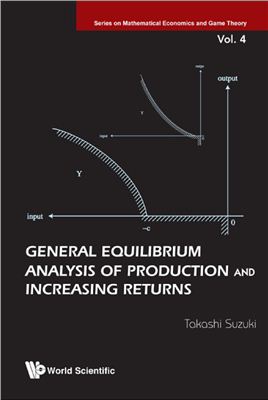Suzuki Takashi - General equilibrium analysis of production and
increasing retus, World Scientific Publishing Co. Pte. Ltd. ,
Series on Mathematical Economics and Game Theory — Vol. 4, 2009 -
285p.
The economies of the mode advanced countries are characterized by the.
enormous extension of the markets, the rapid development of the technologies,
and the further monopolization of the markets by small numbers of big companies.
These characters of the markets are mutually related and, at least the last two of.
them belong to the Marshallian tradition of the economic thought. The mode.
general equilibrium theory which has essentially grown out of the Walrasian tradition.
so far, therefore, is not sufficient for considering the problems arising from.
the markets with these characters. In order to tackle these problems successfully,
I believe that one has to go back to Marshall and construct the theory which unifies.
the ideas of the two great masters of the equilibrium analysis. The following.
chapters try to be a first step toward such a theory. I want to show in this book that.
the main body of the Marshallian concepts including the increasing retus and the.
monopolistic competition does indeed fit into the scheme of the mode general.
equilibrium theory. At the same time, I hope that this book will be a text book of.
the general equilibrium theory for graduate students. Therefore, its purpose will.
be achieved if it becomes a good companion for the students who are ambitious to.
contribute to any further developments of the theory.
Introduction.
From the th Century to the s.
After the s; Existence of Equilibrium and Core.
Limit Theorem.
The Local Uniqueness and Stability of Equilibria.
Markets with a Continuum of Traders.
Increasing Retus and Monopolistic Competition.
Markets with Infinitely Many Commodities.
The Organization of the Book.
Notes.
Classical exchange economies.
Commodities and Markets.
The Preference of a Consumer.
The Demand of a Consumer.
The Demand Theory.
Competitive Equilibria of a Classical Exchange Economy.
A Limit Theorem of the Core of a Classical.
Exchange Economy.
Nash Equilibria and the Core of Games.
The Local Uniqueness of Equilibria.
Notes.
Economies with a continuum of traders.
Markets with a Measure Space of Consumers.
Spaces of Preferences.
Existence of Competitive Equilibria.
The Equivalence of the Core and Equilibria.
Exchange Economies with a Non-Convex Consumption Set.
Production Economies with a Non-Convex Consumption Set.
On The Law of Demand.
Notes.
Production economies with increasing retus.
Classical Production Economies with Competitive Firms.
Core of an Economy with Increasing Retus.
Production Economies with Exteal Increasing Retus.
Pareto Optimality and Tax Policies.
Notes.
Economies with infinitely many commodities.
Markets with Infinitely Many Commodities.
Exchange Economies with Infinite Time Horizon.
Exchange Economies with Differentiated Commodities.
Exchange Economies on a General Banach Space.
Infinite Time Horizon Economies with Exteal.
Increasing Retus.
On the Differentiability of Demand.
Notes.
Economies with monopolistically competitive firms.
Monopolistically Competitive Markets.
Existence of Equilibria with Pricing Rules.
Monopolistically Competitive Equilibria Under Convex Technologies.
Monopolistically Competitive Equilibria with Fixed Costs.
Notes.
Appendix a convex sets and functions.
Appendix b elements of general topology.
The economies of the mode advanced countries are characterized by the.
enormous extension of the markets, the rapid development of the technologies,
and the further monopolization of the markets by small numbers of big companies.
These characters of the markets are mutually related and, at least the last two of.
them belong to the Marshallian tradition of the economic thought. The mode.
general equilibrium theory which has essentially grown out of the Walrasian tradition.
so far, therefore, is not sufficient for considering the problems arising from.
the markets with these characters. In order to tackle these problems successfully,
I believe that one has to go back to Marshall and construct the theory which unifies.
the ideas of the two great masters of the equilibrium analysis. The following.
chapters try to be a first step toward such a theory. I want to show in this book that.
the main body of the Marshallian concepts including the increasing retus and the.
monopolistic competition does indeed fit into the scheme of the mode general.
equilibrium theory. At the same time, I hope that this book will be a text book of.
the general equilibrium theory for graduate students. Therefore, its purpose will.
be achieved if it becomes a good companion for the students who are ambitious to.
contribute to any further developments of the theory.
Introduction.
From the th Century to the s.
After the s; Existence of Equilibrium and Core.
Limit Theorem.
The Local Uniqueness and Stability of Equilibria.
Markets with a Continuum of Traders.
Increasing Retus and Monopolistic Competition.
Markets with Infinitely Many Commodities.
The Organization of the Book.
Notes.
Classical exchange economies.
Commodities and Markets.
The Preference of a Consumer.
The Demand of a Consumer.
The Demand Theory.
Competitive Equilibria of a Classical Exchange Economy.
A Limit Theorem of the Core of a Classical.
Exchange Economy.
Nash Equilibria and the Core of Games.
The Local Uniqueness of Equilibria.
Notes.
Economies with a continuum of traders.
Markets with a Measure Space of Consumers.
Spaces of Preferences.
Existence of Competitive Equilibria.
The Equivalence of the Core and Equilibria.
Exchange Economies with a Non-Convex Consumption Set.
Production Economies with a Non-Convex Consumption Set.
On The Law of Demand.
Notes.
Production economies with increasing retus.
Classical Production Economies with Competitive Firms.
Core of an Economy with Increasing Retus.
Production Economies with Exteal Increasing Retus.
Pareto Optimality and Tax Policies.
Notes.
Economies with infinitely many commodities.
Markets with Infinitely Many Commodities.
Exchange Economies with Infinite Time Horizon.
Exchange Economies with Differentiated Commodities.
Exchange Economies on a General Banach Space.
Infinite Time Horizon Economies with Exteal.
Increasing Retus.
On the Differentiability of Demand.
Notes.
Economies with monopolistically competitive firms.
Monopolistically Competitive Markets.
Existence of Equilibria with Pricing Rules.
Monopolistically Competitive Equilibria Under Convex Technologies.
Monopolistically Competitive Equilibria with Fixed Costs.
Notes.
Appendix a convex sets and functions.
Appendix b elements of general topology.

